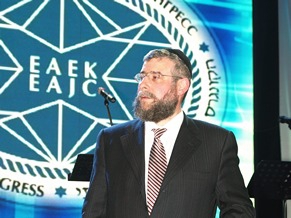|
World Jewish News

Rabbi Pinchas Goldschmidt, president of the Conference of European Rabbis
|
European rabbis rally against kosher slaughter ban, urge Dutch Senate to reject ban
02.11.2011, Religion European rabbis at a landmark meeting in Poland on Tuesday urged Dutch senators to reject a de facto ban on kosher slaughter passed by the lower house of parliament.
Citing humane grounds, The Netherlands in June passed legislation requiring animals to be stunned prior to ritual Jewish kosher "shechita" or Muslim halal slaughter, except if it is proven that animals suffer less without first being stunned.
But both Jewish and Muslim clerics insist stunning is inconsistent with rules governing ritual slaughter.
"We hope that this law is not going to be ratified in the upper house and that it is not going to be accepted by the Dutch people," Rabbi Pinchas Goldschmidt, president of the Conference of European Rabbis told reporters.
Goldschmidt, speaking at the largest meeting of European rabbis to be held in Poland since the Holocaust, said attempts to ban the near 4,000-year-old practice of shechita sound alarm bells as similar steps were taken by Nazi Germany.
In the Nazi era those moves "had more to do with anti-Semitism than with the welfare of animals", he said at a press conference held at the Nożyk Synagogue in Warsaw.
"We remember the last time when shechita was being banned in many countries in Europe and that was under the Nazi occupation," Michael Schudrich, chief rabbi of Poland, told AFP, adding: "Although no one's claiming that Holland is Nazi, it certainly does trigger in us very bad memories."
Terming the Dutch ban a "huge misunderstanding", Schudrich insisted that the nearly 4,000-year-old tradition of kosher slaughter "is one of the most sensitive, humane methods of slaughtering an animal -- it's dead within seconds."
"It seems that the problems in Holland today have less to do with the actual humanitarian aspects of shechita and more with their internal social problems with minority groups," Schudrich observed.
Rabbi Goldschmidt also voiced fears that other Jewish religious rituals could be outlawed.
"The Royal Dutch Medical Association is coming up with a suggestion to ban circumcision -- something we Jews have been doing for the last 3,500 years," he said.
"They come and say you're not only inhuman towards animals, you're inhumane towards your own children. So basically it robs us of our religious and human dignity," he said.
The rabbi also hailed the support of Polish President Bronislaw Komorowski for shechita in talks held late Monday.
Komorowski said the Dutch moves pointed to "a crisis of tolerance."
"One of its symptoms is legislation in the Dutch parliament banning the ritual slaughter of animals, which targets the Muslim and Jewish communities," a presidential statement said.
Other Jewish representatives pointed to factory farming, sport hunting, bull fighting and horse racing as being ethically questionable.
About 200 rabbis from across Eastern and Western Europe attended the two-day convention, which kicked-off Monday.
The bi-annual event is held in various European cities, but rabbis called this year's choice of Warsaw "historic".
The meeting is "a recognition of the re-emergence of a living Jewish community in Poland and of the important role Poland is playing in Europe today as well as its sensitivity to and understanding of Jewish and Israeli issues," Schudrich said, pointing to Poland's ongoing six-month stint as EU president.
Prior to the Holocaust, Poland was home to Europe's largest Jewish population, with a centuries-old community numbering some 3.2 million, roughly 10 percent of the country's population.
Of the six million Polish citizens who died during World War II, half were Jewish. Poland's Jewish population is now estimated at 40,000 to 50,000.
EJP
|
|
